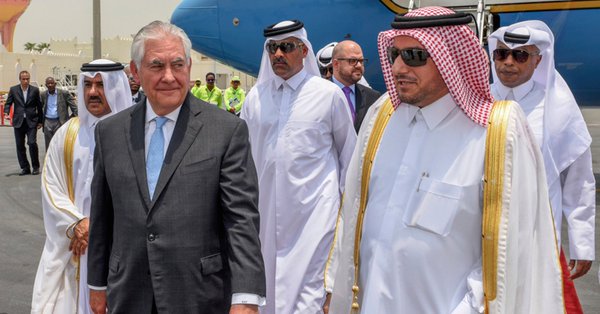
U.S. Secretary of State Rex Tillerson failed to achieve a breakthrough in the month-long crisis between Qatar and Saudi Arabia and its three allies, after talks in Jeddah with their foreign ministers.
Tillerson returned to Kuwait, the mediator between the feuding Gulf countries, without making any statement on his talks in the Saudi Red Sea city of Jeddah. He had signed a U.S.-Qatari accord on terrorism financing on Wednesday, but Qatar’s opponents said it fell short of allaying their concerns.
Any resolution of the impasse must address all the key issues for Saudi Arabia, the United Arab Emirates, Bahrain and Egypt, a senior UAE official said before the talks in Saudi Arabia.
The four countries imposed sanctions on Qatar on June 5, accusing it of financing extremist groups and allying with the Gulf Arab states’ arch-foe, Iran. Doha denies those accusations. The four states and Qatar are all U.S. allies.
Tillerson met the foreign ministers to try to end the worst dispute in decades among the U.S.-allied Gulf Arab states. He also met separately with Saudi King Salman and Crown Prince Mohammed bin Salman to discuss cooperation in combating terrorism and its financing.
“We’re happy to see this continuous cooperation between us and (to) even strengthen it and increase it further without limits …” Mohammed bin Salman said in welcoming Tillerson.
U.S. officials said Tillerson would travel to Qatar on Thursday to brief the emir, Sheikh Tamim bin Hamad al-Thani, on his talks in Jeddah, State Department spokesman R.C. Hammond said.
UAE Foreign Minister Sheikh Abdullah bin Zayed al-Nahayan told reporters during a visit to Slovakia that Tillerson’s visit was unlikely to resolve the row.
“I think it will ease tensions, but it’s just postponing the problem, which will grow in the future.”
In a joint statement issued after Tillerson and his Qatari counterpart signed their counter-terrorism pact on Tuesday, the four states called the accord inadequate.
They also reinstated 13 wide-ranging demands they had earlier submitted to Qatar, the world’s biggest producer of liquefied natural gas, as a condition for removing sanctions.
The demands include curbing Qatar’s relations with Iran, closing the Doha-based Al Jazeera TV channel, shutting a Turkish military base in Qatar and handing over all designated “terrorists” on its territory.
Anwar Gargash, the UAE minister of state for foreign affairs, sent a formal complaint to the U.N. High Commissioner for Human Rights on Wednesday alleging that Al Jazeera supported terrorism, sectarianism and anti-Semitism.
Al Jazeera, which has denied allegations of stoking violence and says it practices free speech, did not immediately respond to a request for a comment.
SOURCE: NAN









